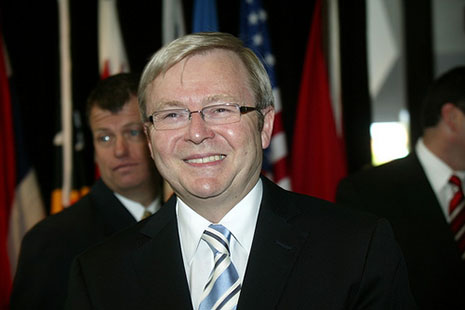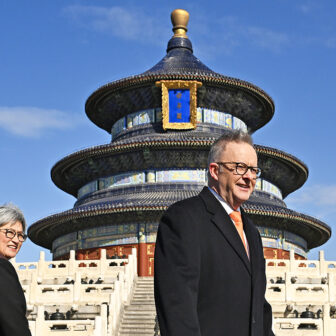KEVIN RUDD’s China strategy advice to Hillary Clinton has sent the excitable Australian media into a near-frenzy. A plan for war in the last resort, some said; a plan to contain Beijing, said others. Nonsense.
Any reasonable reading of the foreign affairs minister’s words, as reported by WikiLeaks, confirms that he did no more than describe to the US secretary of state, Hillary Clinton, what western nations were in fact doing at present to meet the rise of Chinese economic and military power. If Clinton was impressed by Rudd’s wisdom and insight she should not have been. His remarks were anodyne and commonplace, distinguished only by his observation that he was a “brutal realist” on China. (One might hope that the foreign affairs minister is a realist on all aspects of Australian international policy – if he means that he sees the international order as the interplay of anarchic nation states best kept at peace by sharing and balancing power and interests.)
But consider Rudd’s view as reported in the leaked cable: “Rudd argued for ‘multilateral engagement with bilateral vigor’ – integrating China effectively into the international community and allowing it to demonstrate greater responsibility, all while also preparing to deploy force if everything goes wrong.” That is the nerve of it – and it is the almost exclusive thrust of global diplomacy towards China these days.
You see it in the efforts of nations to draw China more deeply into international economic cooperation, trade deals and international organisations; you see it in the pressure put on China to lift its human rights game and to hose down North Korean nuclear gamesmanship and aggression. It’s all about integration.
So the first leg of the policy is highly visible engagement through broad global and bilateral initiatives. The second leg is the preparation of force if engagement fails to encourage China towards integration into the international order, and this too is self-evidently visible. It is the rationale for the 2009 Australian defence white paper with its stress on greatly expanded maritime and air power; it explains Japan’s naval expansion, and the evolving security talks between the United States, Japan and Australia. Above all, it explains the revived American enthusiasm for maintaining a dominant naval presence in the Pacific.
So China is being simultaneously welcomed and warned. It seems a sensible approach, but it may be easier to describe than to achieve given China’s view of the world – as Rudd, a China scholar, will know better than most.
China regards itself as a great and ancient civilisation of a higher order than the states, societies and tribes who occupy the inner and outer barbarian worlds beyond the middle kingdom. The Chinese are not deeply interested in what Rudd or anyone else thinks about them. It is they, after all, who hold the mandate of heaven.
They have been repressed in the past by those who would now seek to integrate them and they have suffered great humiliation. Thus they are a dissatisfied power and are engaged in territorial disputes with the outer and inner barbarians. They will not come easily to integration.
They will have to be persuaded that the benefits of being rich and powerful are worth some of the trade-offs and behaviour modifications that the western allies are seeking through the integration or power deployment strategies. But the effort will require more than Ruddian one-liners. The Chinese (and all Australians) know the value of the Chinese market to the world. It is China’s ace in the hole.
Rudd told Clinton that the Australian intelligence community is closely watching China’s military expansion. So it should. It is a massive and quite opaque expansion that seems more than adequate to protect a growing nation’s security and sea-lines of communications and to project power that will eventually challenge US naval dominance. The Chinese expansion clearly suggests that China, too, is preparing to develop force deployment if integration does not work.
Perhaps the real significance of the Rudd–Clinton exchange is that it shows again the difference between the private conversation and public rhetoric of leaders. It is hardly surprising, but it is quite revealing and it did not need the wild surmise attached to it by the more breathless practitioners of Australian journalism. •




